Rugendo Group Battles Respiratory Disease Outbreak
By Gorilla Doctors Staff on Monday, May 11th, 2015 in Blog.The Rugendo group mountain gorillas have been battling a respiratory disease outbreak since early April, keeping Drs. Eddy and Martin on their toes as they administer treatment to the group members most severely affected by the illness.
Several group members began to exhibit symptoms of a respiratory infection on April 14th, when the ICCN trackers observed silverback Bukima coughing on the first day, with silverback Kongomani coughing on the next day. As the week progressed, blackback Noel and juvenile Mastaki also began to show symptoms and the Gorilla Doctors were notified for a veterinary assessment.
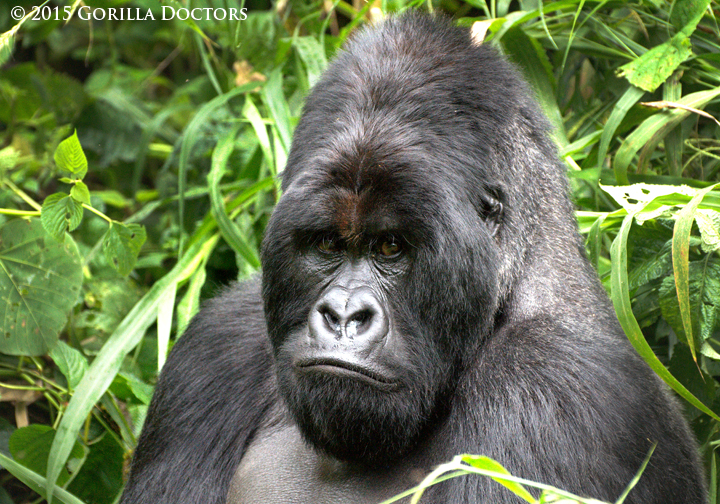
Silverback Kongomani with nasal discharge.
On April 20, Dr. Eddy traveled from Goma to the Bukima patrol post in Virunga National Park. It is the rainy season and the travel was arduous, particularly on the muddy road near Bukima, and his truck got stuck on three separate occasions. The Head DRC Field Vet eventually made it to his destination and prepared to enter the forest early the following morning.
Rugendo group was ranging in the Kinyagurube area of the park at 2162 meters in altitude on the morning of April 21. The group was resting when Dr. Eddy and the field team arrived. Immediately, six gorillas were observed coughing: silverbacks Kongomani and Bukima, adult female Janja, subadult male Bagambe, juvenile Mastaki and blackback Noel. Silverback Kongomani appeared lethargic and anorexic and he had not moved from his night nest. His cough was deep and laborious and was clearly in need of veterinary treatment. Dr. Eddy darted the silverback with an antibiotic and in the coming days, administered antibiotics to Bagambe, Baseka, Janja and her infant.
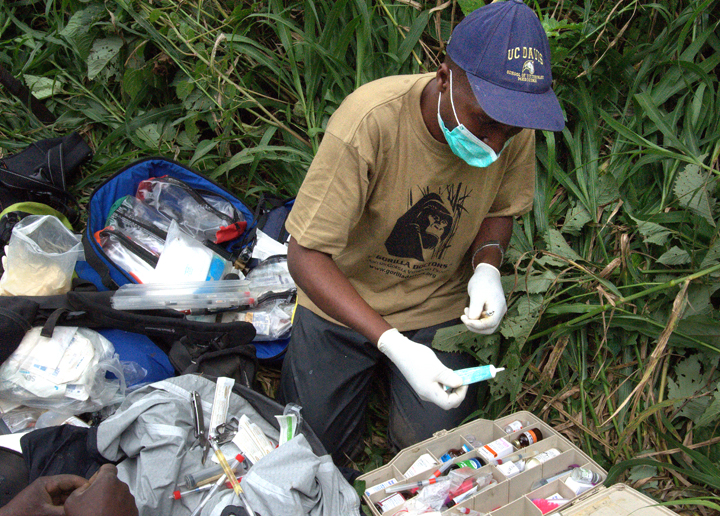
Dr. Eddy prepares medication for the intervention.
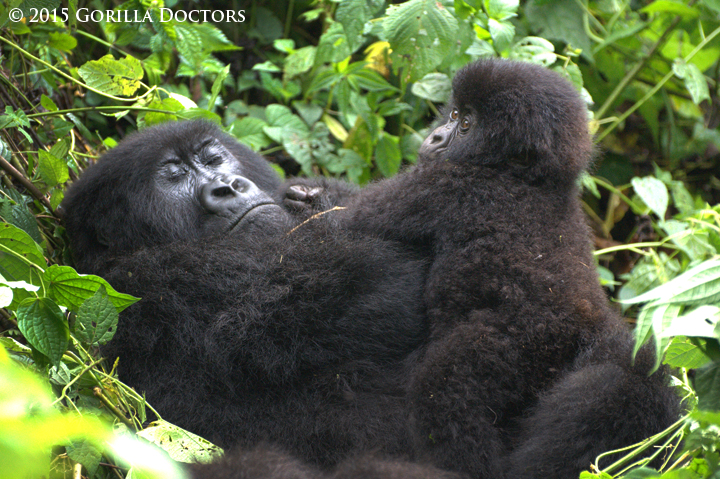
Janja resting with her infant
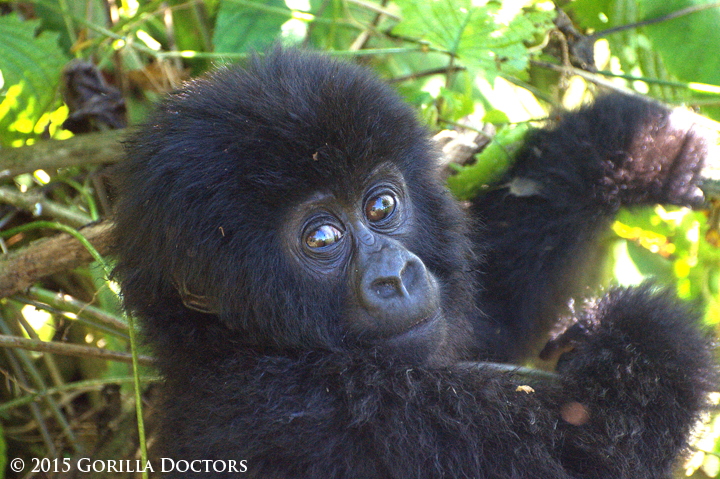
Janja’s infant in Rugendo group, Virunga National Park
On April 28, when Dr. Eddy was en route back to Rugendo group, his field team was charged by a lone male buffalo. One of the trackers was severely injured when the buffalo’s horn cut into the side of his head. Dr. Eddy administered first aid treatment, stopping the bleeding and wrapping the wound, and he accompanied him back to the patrol post, where an ICCN nurse sutured the wound. Once the tracker was taken care of, Dr. Eddy and the field team returned to the forest to trek Rugendo group.
Dr. Eddy stops the bleeding on a tracker’s head injury after being charged by a buffalo.
On May 5, Drs. Eddy and Martin returned to the group to follow up on the sick gorillas. Upon arrival to the group, silverback Kongomani and blackback Noel appeared anxious and were charging and vocalizing. The field team quickly realized that the rest of the group was nowhere to be seen. The two males charged the field team and Drs. Eddy and Martin and the accompanying ICCN trackers retreated. They came upon a trail which led them to an unknown lone silverback. The large male did not charge and seemed habituated to human presence. Drs. Eddy and Martin observed him for 10 minutes while the silverback fed calmly before leaving to track the rest of Rugendo group. After an hour, the field team located the other group members, none of whom were exhibiting any signs of respiratory illness. The group was calm and feeding on bamboo shoots and Drs. Eddy and Martin reported that each individual was in good visual health.
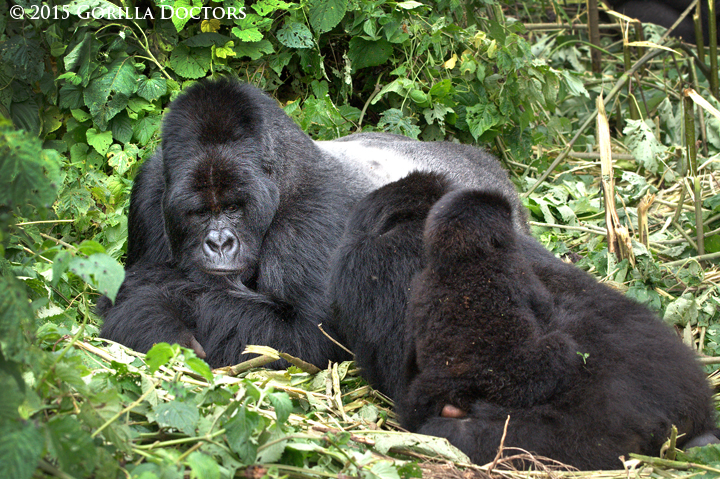
Kongomani, Janja and her infant resting among the bamboo.
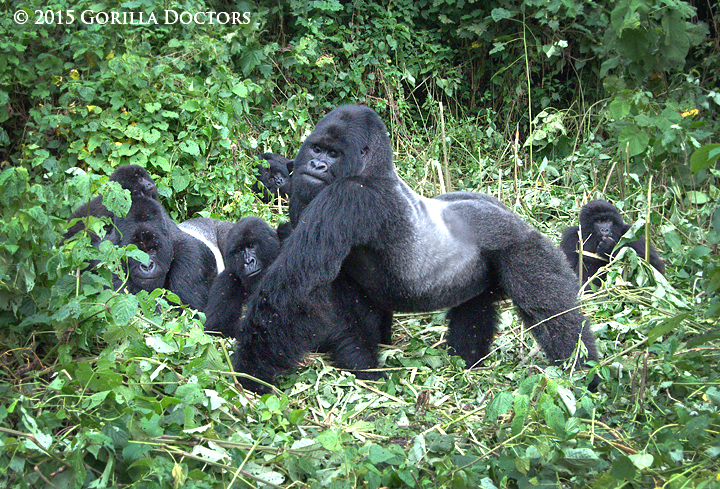
Silverback Bukima and other members of Rugendo group in Virunga National Park.
Second only to trauma (e.g. fatal injuries caused by fights, accidents or snares), infectious disease is the leading cause of death in mountain gorillas, accounting more than 20% of mortality. The most common infection is respiratory disease, which can range from a mild cold to severe pneumonia. For this reason, Gorilla Doctors respond quickly to treat respiratory disease outbreaks to prevent the illness from spreading further in the group and keep any affected individuals from becoming so sick that it could be life threatening.


 Donate
Donate